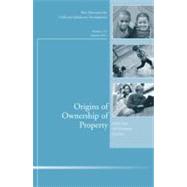
| Twenty-One Reasons to Care About the Psychological Basis of Ownership | p. 1 |
| This introductory chapter answers the question of why ownership and its development provide important new directions for psychological study. | |
| Property in Nonhuman Primates | p. 9 |
| Brosnan Provides evidence of nonhuman primates' respect for possession, but limited ownership, and argues that primate lifestyles are not conducive to establishing the social and institutional controls that support property. | |
| Possession and Morality in Early Development | p. 23 |
| Rochat Outlines a six-level developmental theory through which children gradually incorporate moral considerations into a sense of ownership and possession. | |
| Early Representations of Ownership | p. 39 |
| Blake and Harris Consider how young children represent ownership based on two potentially competing sources of information-observed associations between people and objects, and others' testimony about who owns what. | |
| Property Rights and the Resolution of Social Conflict | p. 53 |
| These authors examine the discrepancy between how young children and their parents regard ownership, especially as it applies to conflict between siblings and peers. | |
| Ownership as a Social Status | p. 65 |
| Kalish and Anderson Argue that ownership is a social construct, and consider whether children view it as such. | |
| Ownership and Object History | p. 79 |
| These authors argue that inferences about the history of an object are fundamental to judgments about whether an object is owned and, if so, by whom. | |
| Exploring Ownership in a Developmental Context | p. 91 |
| In this chapter, the authors examine how children judge which things can be property, who can be an owner, and how children reason about ownership transfers. | |
| Index | p. 105 |
| Table of Contents provided by Ingram. All Rights Reserved. |
The New copy of this book will include any supplemental materials advertised. Please check the title of the book to determine if it should include any access cards, study guides, lab manuals, CDs, etc.
The Used, Rental and eBook copies of this book are not guaranteed to include any supplemental materials. Typically, only the book itself is included. This is true even if the title states it includes any access cards, study guides, lab manuals, CDs, etc.